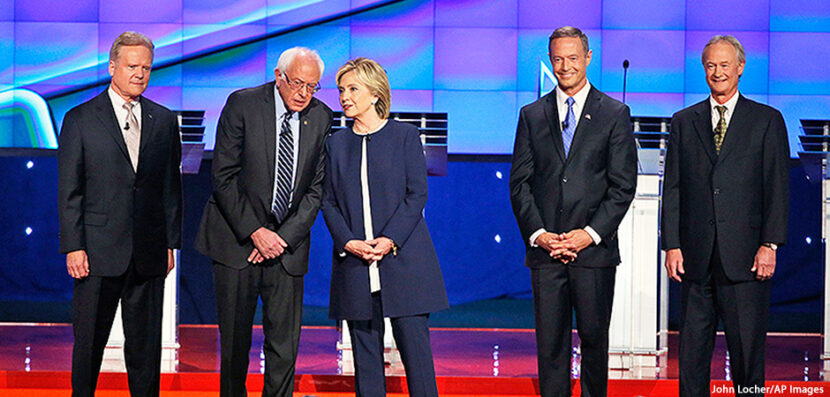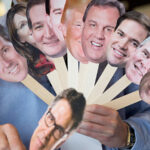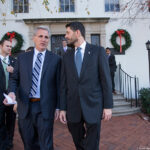
Democrats Take Center Stage
Last month, Election Central delivered news of the first Republican candidate debate. This month, it was the Democratic candidates’ turn. On September 13, in Las Vegas, Nevada, CNN hosted the first of six scheduled Democratic Party debates between now and March 2016. Moderating the event was news anchor Anderson Cooper, with additional questions from reporters Dana Bush, Juan Carlos Lopez, and Dan Lemon. The participating candidates were Bernie Sanders, Hillary Clinton, Martin O’Malley, Jim Webb (who dropped out of the running for the party nomination soon after this debate), and Lincoln Chafee. Vice President Joe Biden had earned enough polling (at least 1% in three nationally recognized voter polls) to be eligible to participate, but he did not participate. And, Biden announced earlier this week that he would not be running for president as some party faithful hoped that he might.
Biggest Issues Addressed
- Political Identity Bernie Sanders is a self-described democratic socialist. He described this as, “saying that it is immoral and wrong that the top one-tenth of one percent in this country . . . own as much wealth as the bottom 90 percent.” Hillary Clinton, on the other hand, calls herself a progressive, emphasizing the “importance of nurturing the United States’ entrepreneurial spirit while reining in the excesses of capitalism.”
- Income Inequality All of the participating Democratic candidates stood united in their stance against the increasing gap between the richest and poorest Americans. A higher minimum wage, pay equality for women and correcting Wall Street regulation were some of the solutions offered. Martin O’Malley and Sanders called for the reinstatement of the Glass-Steagall Act, a law initially passed during the Great Depression that prevented financial institutions from engaging in risky investments. The law was repealed in 1999. Clinton said she had a different approach that was more “forward-looking.” Lincoln Chafee stumbled in his answer, implying that he was uninformed when he voted to repeal the bill in Congress.
- Climate Change All of the candidates except for Jim Webb mentioned this issue in their opening statements. Chafee called it a “real threat to our planet.” O’Malley pledged to have the United States using 100 percent renewable energy by the year 2050, claiming it would be his first action as president. Clinton defended her position on the Keystone XL pipeline and highlighted her role in working with China to address climate change. Sanders called the topic a “moral issue.”
- Gun Control Sanders was singled out because of his vote in Congress against various gun control restriction, which contrasts with his more liberal stances on other issues. On the other end, former Maryland governor O’Malley has a record of strict gun policy reforms and noted that a failed gun control bill prevented the family of the Aurora movie theater victim from suing the seller of military ammunition to the shooter.
Performance
The two main Democratic front-runners–Hillary Clinton and Bernie Sanders were considered by observers to be the “big winners” of the night. Of the other remaining candidates, Martin O’Malley gained the most traction in the public’s view by commanding more air time and ending this first debate with a strong closing statement. None of the candidates, however, gained much by way of increased approval polling. Webb was seen as spending much of his time complaining about how he didn’t get as much time to speak as the others. Chafee’s stumble over the Glass-Steagall bill highlighted a general impression that he did not perform well.


